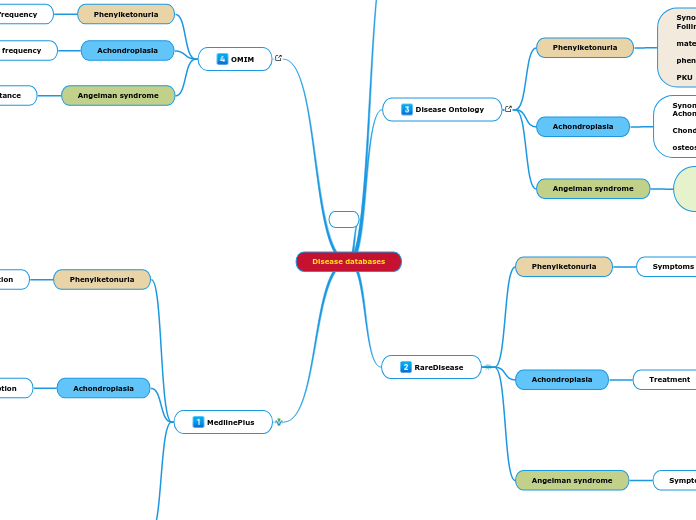Disease databases
MalaCards
Phenylketonuria
Mode of inheritance
Autosomal recessive
Achondroplasia
Inheritance: Autosomal dominant
Angleman syndrome
Population frequency
(Worldwide),1-9/100000
Disease Ontology
Phenylketonuria
Synonyms
Folling's disease [EXACT]
maternal phenylketonuria [EXACT]
phenylalaninemia [EXACT]
PKU [EXACT]
Parent Relationships
is_a amino acid metabolic disorder
Achondroplasia
Synonyms
Achondroplastic physique [EXACT]
Chondrodystrophia [EXACT]
osteosclerosis congenita [EXACT]
Parent Relationships
is_a osteochondrodysplasia
Angelman syndrome
Synonyms
happy puppet syndrome [EXACT]
puppetlike syndrome [EXACT]
Description
A syndrome that is characterized by delayed development, intellectual disability, severe speech impairment, and problems with movement and balance.
RareDisease
Phenylketonuria
Symptoms
Aminoaciduria
High urine amino acid levels. Intellectual disability, severe
Early and severe mental retardation Abnormality of cardiovascular system morphology Aggressive behavior and Anxiety Excessive, persistent worry and fear
Treatment
1-Sapropterin 2-Pegvaliase
Achondroplasia
Treatment
• Monitoring of height, weight, and head circumference using growth curves standardized for achondroplasia
• Measures to avoid obesity starting in early childhood.
• Careful neurologic examinations, with referral to a pediatric neurologist as necessary
• MRI or CT of the foramen magnum region for evaluation of severe hypotonia or signs of spinal cord compression
Angelman syndrome
Symptoms
Absent speech development. Behavioral changes Blue irides /Blue eyes Brachycephaly
Short and broad skull
Treatment
Anti-seizure medications (anticonvulsants) Sleep disorders are common and may require behavioral therapy and adherence to strict bedtime routines
OMIM
Phenylketonuria
Population frequency
PKU occurs in about 1 in 10,000 births
Achondroplasia
Population frequency
Early estimates on the prevalence of achondroplasia are undoubtedly incorrect because of misdiagnosis.
Angelman syndrome
Mode of inheritance
Angelman syndrome results from a lack of maternal contribution from chromosome 15q11-q13,
MedlinePlus
Phenylketonuria
Description
Phenylketonuria (PKU) is a type of amino acid metabolism disorder. It is inherited. If you have it, your body can't process phenylalanine (Phe). Phe is an amino acid, a building block of proteins. It is in almost all foods. If your Phe level gets too high, it can damage your brain and cause severe intellectual disability.
Achondroplasia
Description
Achondroplasia is a form of short-limbed dwarfism. The word achondroplasia literally means "without cartilage formation." Cartilage is a tough but flexible tissue that makes up much of the skeleton during early development. However, in achondroplasia the problem is not in forming cartilage but in converting it to bone (a process called ossification), particularly in the long bones of the arms and legs. Achondroplasia is similar to another skeletal disorder called hypochondroplasia, but the features of achondroplasia tend to be more severe.
Causes
Mutations in the FGFR3 gene cause achondroplasia. The FGFR3 gene provides instructions for making a protein that is involved in the development and maintenance of bone and brain tissue. Two specific mutations in the FGFR3 gene are responsible for almost all cases of achondroplasia. Researchers believe that these mutations cause the FGFR3 protein to be overly active, which interferes with skeletal development and leads to the disturbances in bone growth seen with this disorder.
Angelman syndrome
Causes
Many of the characteristic features of Angelman syndrome result from the loss of function of a gene called UBE3A. People normally inherit one copy of the UBE3A gene from each parent. Both copies of this gene are turned on (active) in many of the body's tissues. In certain areas of the brain, however, only the copy inherited from a person's mother (the maternal copy) is active. This parent-specific gene activation is caused by a phenomenon called genomic imprinting. If the maternal copy of the UBE3A gene is lost because of a chromosomal change or a gene mutation, a person will have no active copies of the gene in some parts of the brain.
